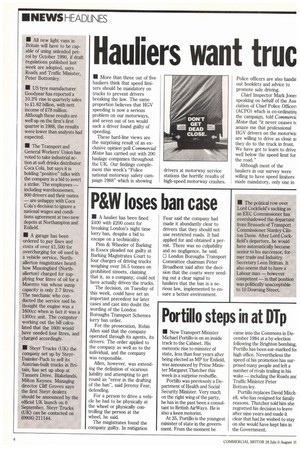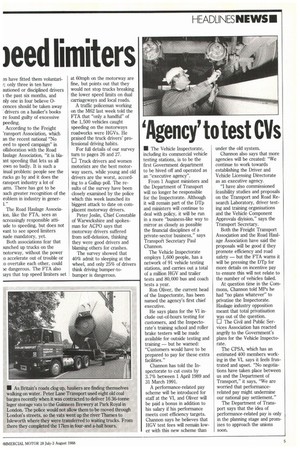Hauliers want truc
Page 4

Page 5

If you've noticed an error in this article please click here to report it so we can fix it.
med limiters
• More than three out of five hauliers think that speed limiters should be mandatory on trucks to prevent drivers breaking the law. The same proportion believes that HGV speeding is now a serious problem on our motorways, and seven out of ten would sack a driver found guilty of speeding.
These hard-line views are the surprising result of an exclusive opinion poll Commercial Motor has carried out with 200 haulage companies throughout the UK. Our findings complement this week's "Police national motorway safety campaign 1988" which is showing drivers at motorway service stations the horrific results of high-speed motorway crashes. Police officers are also Iran& out booklets and advice to promote safe driving.
Chief Inspector Mark jone speaking on behalf of the Ass ciation of Chief Police Officer: (ACPO) which is co-ordinatini the campaign, told Cormier& Motor that "it never ceases tc amaze me that professional HGV drivers on the motorwa: are willing to drive as close at they do to the truck in front. We have got to learn to drive well below the speed limit for the road."
Although most of the hauliers in our survey were willing to have speed limiters made mandatory, only one in !ri have fitted them voluntarir; only three in ten have autioned or disciplined drivers the past six months, and nly one in four believe 0cences should be taken away drivers on a haulier's books re found guilty of excessive peeding.
According to the Freight 'ransport Association, which an the recent national "No eed to speed campaign" in ollaboration with the Road Iaulage Association, "it is blaant speeding that lets us all own so badly. It is such a isual problem: people see the rucks go by and it does the ransport industry a lot of arm. There has got to be auch greater recognition of the • roblem in industry in generm, The Road Haulage Associaion, like the FTA, sees an ncreasingly responsible attiude to speeding, but does not vant to see speed limiters nade mandatory, yet.
Both associations fear that minched up trucks on the notorway, without the power :o accelerate out of trouble or :o overtake each other, could ie dangerous. The FTA also iays that top speed limiters set at 60mph on the motorway are fine, but points out that they would not stop trucks breaking the lower speed limits on dual carriageways and local roads.
A traffic policeman working on the M62 last week told the FTA that "only a handful" of the 1,500 vehicles caught speeding on the motorways roadworks were HGVs. He praised the truck drivers' professional driving habits.
For full details of our survey turn to pages 26 and 27.
Truck drivers and women motorists are the best motorway users, while young and old drivers are the worst, according to a Gallup poll. The results of the survey have been closely examined by the police which this week launched its biggest attack to date on complacent motorway drivers.
Peter Joslin, Chief Constable of Warwickshire and spokesman for ACP° says that motorway drivers suffered from self-delusion, thinking they were good drivers and blaming others for crashes.
The survey showed that 40% admit to sleeping at the wheel, and only 25% of drivers think driving bumper-tobumper is dangerous.








































































